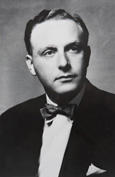Irving Fine at 100
November 7, 2014
By Jacques Dupuis | GSAS
This is a guest post by Jacques Dupuis, PhD Candidate in Musicology.
 Irving Fine was born on December 3, 1914 in East Boston to George–a newspaper man turned lawyer turned stock-market investor–and Charlotte Fine. Early on, young Irving displayed traits that pointed to a promising life as a musician: perfect pitch, talent on the piano, high interest in the classical greats, and a driven attitude toward learning. He would eventually make his way to Harvard University, study with prominent composers, spend time with the distinguished pedagogue Nadia Boulanger in France, and make connections with a group that would come to be known as the “Boston School” of composers, which included Leonard Bernstein, Aaron Copland and future Brandeis faculty members, Arthur Berger and Harold Shapero.
Irving Fine was born on December 3, 1914 in East Boston to George–a newspaper man turned lawyer turned stock-market investor–and Charlotte Fine. Early on, young Irving displayed traits that pointed to a promising life as a musician: perfect pitch, talent on the piano, high interest in the classical greats, and a driven attitude toward learning. He would eventually make his way to Harvard University, study with prominent composers, spend time with the distinguished pedagogue Nadia Boulanger in France, and make connections with a group that would come to be known as the “Boston School” of composers, which included Leonard Bernstein, Aaron Copland and future Brandeis faculty members, Arthur Berger and Harold Shapero.
It was in 1950 that Erwin Bodky, founder of the department of music at Brandeis, convinced Fine to spend the remainder of his career at the fledgling university. Though he remained affiliated with the Boston Symphony Orchestra and Tanglewood’s Berkshire Music Center, Fine would continue at Brandeis until his premature death in 1962. Along the way, he helped to establish the School of Creative Arts and the graduate program in music composition, the first graduate program at the university.
Today, the legacy of Irving Fine endures in the music department at Brandeis. Upon entering the doors of Slosberg Music Center, visitors are met by two enduring symbols of Fine’s impact: a modest portrait in black and white leading toward the building’s active recital hall, and a dignified, burnished bust depicting his distinctive profile. More significant than these mementos is the professorship of music composition that bears his name, currently held by the Dean of the Graduate School of Arts and Sciences (GSAS), Dr. Eric Chasalow. Fine’s tireless work to establish a culture that holds the arts in high regard is manifest today in a thriving arts scene at the Brandeis, including music, theater and visual arts.
That the current Irving Fine Professor of Music serves as the Dean of GSAS is a fitting testimony to Fine’s varied skills and passions as an educator, artist, and administrator, helping to maintain the founding principles of the university manifest in the community of professors, students and alumni. Says Chasalow, “Irving Fine's dedication to Brandeis very quickly helped to build our reputation as one of the premiere music departments in the country–a magnet for the very top composers and musicologists. We are very proud of his legacy as educator and composer and grateful for the sacrifices he made on our behalf. While his memory is part of our identity every day, we are especially happy to be able to partner with the Fine family and outstanding arts institutions to celebrate the Fine Centennial.”
On November 15th, 2014, at 2:30 PM in Slosberg Music Center, the Brandeis Department of Music will host a one-day symposium in honor of the 100th anniversary of Fine’s birth. Speakers include Brandeis professor emeritus and Pulitzer Prize winning composer Yehudi Wyner, former Fine student and additional Pulitzer Prize winner, Richard Wernick, and former Fine student and long-time cantor, Ramon Gilbert. Following comments by each of these distinguished speakers will be a panel discussion moderated by Chasalow, which promises to be an enlightening tribute to the prominent life and career of Fine. The night will be capped by an all-Fine concert of chamber music by the New York-based ensemble, Music at Copland House. This Brandeis event is only one of many events in tribute to Fine to be held in the coming months, including a series of concerts, lectures and panels at the Library of Congress beginning on December 2nd, various choral and chamber music concerts, and the release of a recording of Fine’s music by the Boston Modern Orchestra Project.
Crossing paths with his face each day constantly and consistently reminds those of us who study in his field of the standard of excellence he worked to set, a standard strived for by many of the succeeding generations of musicians and professors that have gone on to shape the landscapes of some of the most prominent institutions of higher learning in this country. It is not difficult to trace back to this man through countless channels and realize the enduring impact his work and life had in Waltham, Boston, New England and beyond.






